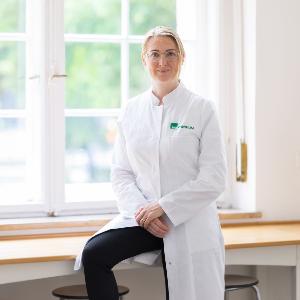The best of both worlds
27 Sept 2021
Inga Koerte conducts research of brain trauma at LMU and Harvard Medical School. The physician and scientist is one of the winners of this year’s Prinzessin Therese von Bayern Preis.
27 Sept 2021
Inga Koerte conducts research of brain trauma at LMU and Harvard Medical School. The physician and scientist is one of the winners of this year’s Prinzessin Therese von Bayern Preis.

Inga Katharina Koerte's work centers around exploring how head traumas affect the brain. | © Nils Krüger
Inga Katharina Koerte first became aware of the Prinzessin Therese von Bayern Preis when she began her residency as a medical specialist in training. She then promptly convinced her mentor, radiologist Birgit Ertl-Wagner, to apply for the award. “She was an example to everyone at the Faculty of Medicine,” Koerte says. Ertl-Wagner did apply – and won the prize in 2013. The Princess Therese von Bayern Foundation, whose primary aim it is to highlight the achievements of female academics at LMU, regularly honors distinguished female researchers.
Since then, Koerte herself has become Professor of Neurobiological Research in Child and Adolescent Psychiatry at the Faculty of Medicine at LMU and leads the Child Brain Research and Imaging in the Neuroscience (cBRAIN) Research Group. Since 2011, she has also been a lecturer for Harvard University Medical School, and engaged in research at Brigham and Women’s Hospital.
This year, it was her turn to be honored with the prize, which is given in recognition of outstanding scientific achievements at LMU. “It’s becoming a kind of tradition,” Koerte smiles. “The important thing is to pass things on, to take mentoring so seriously that genuine networks take shape. When scientists support and encourage each other, there is so much we can achieve.”
Koerte’s scientific work centers around exploring how head traumas affect the structure, functioning and development of the brain. For example, she and her team were the first to publish evidence of changes in brain microstructure related to heading the ball in soccer.
From a very early age, it seemed obvious that she would go into medicine. Koerte was fascinated by the human body and its inner workings as early as elementary school. “I wanted to understand how things are connected,” she says. The desire to get to the bottom of things and question everything has remained her prime motivation. “During medical school, I developed a deep interest in evidence-based medicine,” the physician adds. “Why do we prescribe this medication instead of that one? To me, it was important to base every medical decision on solid scientific evidence.”
The willingness to try something out and not be discouraged by setbacks is the prerequisite for innovation.Inga Katharina Koerte
After finishing her studies, Koerte specialized in a number of areas, earning her doctorate in experimental surgery, completing further specialized training in pediatrics and radiology, and finally qualifying as professor by completing a habilitation in experimental radiology.
The time she spent as a postdoctoral researcher at Harvard Medical School was an especially formative step along the way: “US-based research has more of a culture of trial and error,” Koerte explains. “The willingness to try something out and not be discouraged by setbacks is the prerequisite for innovation.” On the other hand though, she has a deep appreciation for the meticulous planning that forms the German research culture. In all her scientific activities, Koerte strives to combine the two. “Many important research findings are the result of well-prepared coincidences,” she says.
The attitude that ‘nothing is impossible’ is a trait she further developed in the USA, and it has shaped her trajectory to date. Koerte’s career in research reflects a constant willingness to take the road less traveled, energetically and with a passion for experimentation. She has a way of getting things done that, especially in these times, are perceived as unconventional or unusual. For example, she teaches and conducts research at not one, but two, elite universities, while also leading a large research team at LMU that is financed solely by the third-party funds she obtains.
“In the USA, I got used to writing applications as just something you do,” Koerte notes. “Working on two continents also opens up international sources of external funding that are of interest to my research.” Some of her projects, for example, receive financial backing from the US National Institutes of Health. Others benefit from EU funding – such as the prestigious ERC Starting Grant, which Koerte secured in 2018.
Each project is aligned with her philosophy of always placing medical research directly in the service of the patient. One of the topics she and her team are working on is how changes to the brain due to head trauma can be visualized using advanced neuroimaging methods in order to characterize individual patients’ head injury profiles. This work provides the basis for developing personalized therapeutic strategies to recover from injury.
I love it when I see the up-and-coming scientists I work with developing their potential in all kinds of different directions.Inga Katharina Koerte
Inga Koerte attaches huge importance to developing young talent. Since April, she has been director of the StEP program at the Faculty of Medicine. This program was established to identify talented medical students and to foster their career from an early stage. It is this kind of activity Koerte relishes in her job. She compares it to the chaperone protein, which helps new proteins with their complex folding structures, albeit without itself becoming part of those structures. “I love it when I see the up-and-coming scientists I work with developing their potential in all kinds of different directions,” Koerte affirms. “It’s great to see their talent shine – and to see these people achieving more than they would ever have believed possible.”